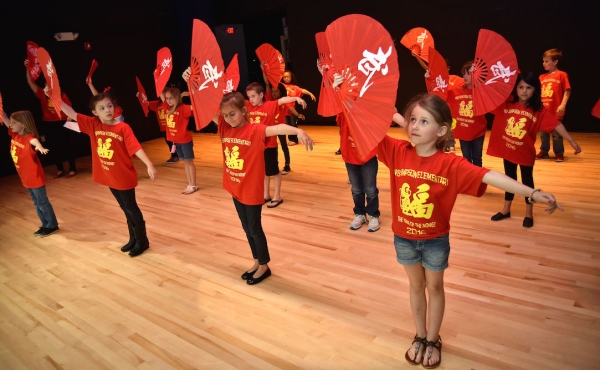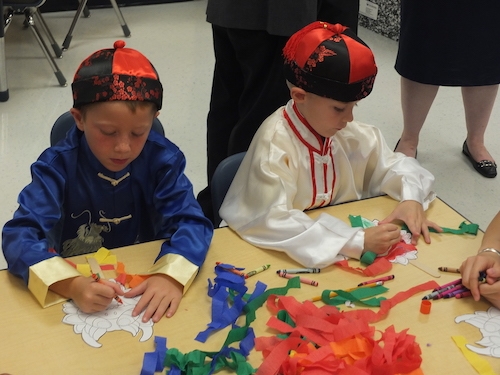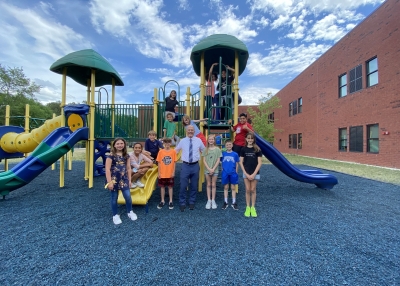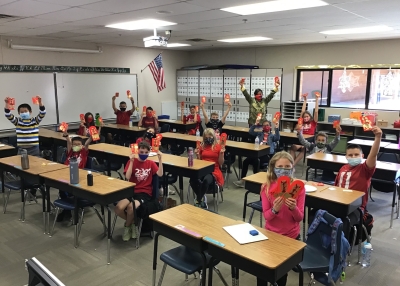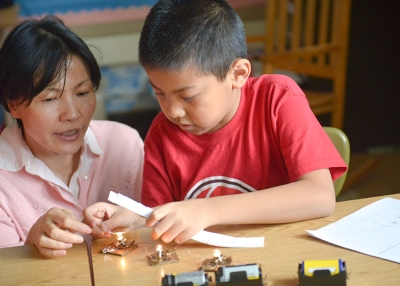Delaware Chinese Immersion Programs
Delaware Chinese Immersion Programs
Currently serves students in grades K–5; programs will articulate through secondary school to serve students in grades K–12
www.doe.k12.de.us/domain/68
A 2016 video showcasing Delaware’s Chinese Immersion Program in the Colonial School District
Program Description
The Delaware Department of Education supports instruction for more than 137,000 students in public and public charter schools in 19 school districts. Chinese Language Immersion programs are currently established or being planned in 30% of eligible school districts across the state, including Appoquinimink, Caesar Rodney, Christina, Colonial, and Red Clay. During the 2016–17 school year, the program involves 700 students and 32 teachers.
Delaware Chinese Language Immersion Programs are part of the larger Governor’s World Language Expansion Initiative created by Governor Jack Markell in 2011. This state-level initiative proposes an aggressive world language education plan that prepares Delaware students with the language skills to compete in an ever-changing global economy at home and around the world. In essence, Delaware will begin to graduate globally competent students with advanced-level proficiency in languages, giving them an economic advantage in the multilingual and multicultural workforce of the 21st century. Program growth is exceeding the original targets, and it is expected that 1 out of every 7 kindergarten students in Delaware will be enrolled in a language immersion program in the 2017–18 school year.
As parent demand for these programs continues to increase, the number of programs will continue to grow. By the 2020 school year, it is estimated that 10% of elementary schools in the state will offer Chinese Language Immersion programs and serve more than 2,000 students. As business relationships deepen between Delaware and China, having skills to communicate in Mandarin will be an invaluable economic advantage, and students leaving these programs with strong skills in two languages will be well-positioned to compete at home and abroad in the global economy.
As each district has implemented Chinese Language Immersion programs in kindergarten, it has also expanded its Chinese language offerings in middle and high school. Six new middle school Chinese programs have been established since 2012, and two new high school Chinese programs have been established. These programs not only meet the needs of current students, but they also set the stage for successful articulation of elementary immersion with secondary immersion continuation programs in the coming years.
Elementary School Program Model
The Delaware Chinese Language Immersion Programs begin in Kindergarten and follow a 50/50 model in grades K–5. In this model, instructional time and content are split between a Chinese-speaking teacher who teaches exclusively in Chinese and an English-speaking teacher who teaches exclusively in English. Students spend 150 minutes with their Chinese language teacher and another 150 minutes with their English teacher. The Chinese teacher is responsible for teaching Math, Science, and Language Arts in Chinese. In some districts, the Chinese teacher also teaches portions of the Social Studies curriculum. The English language teacher teaches English Language Arts as well as elements of Social Studies from the Delaware Recommended Curriculum. This teacher also reinforces Math and Science content by planning collaboratively with their partner teacher for transfer of skills and knowledge learned in Chinese to activities carried out in English.
Secondary School Program Model
Participating districts have identified K–12 articulation patterns for students enrolled in Chinese Language Immersion programs. During the 2015–16 academic year, a 13-member committee worked to review high-performing secondary immersion models nationally and created recommendations for Delaware’s secondary immersion program. The Middle School Immersion Advisory Committee Summative Report details expectations and recommendations. Delaware Middle School Immersion Continuation Programs will offer students a minimum of two courses per year taught exclusively in the immersion language. One course must be an advanced-level language course designed to maximize student language proficiency, based on AP themes and tasks. The second course must address core academic content of Social Studies in Grades 6 and 7 and Science in Grade 8. Schools are expected to establish sister-school relationships beginning in Grade 6, which lead to a capstone project or experience embedded throughout the 8th grade year.
Immersion Continuation students will be prepared to enroll in an Advanced Placement language course during their 9th grade year and will be encouraged to begin study of an additional world language, such as Arabic, that could also culminate in additional Advanced Placement credit by graduation. Delaware students will also have opportunities in grades 10–12 to participate in dual-credit/dual-enrollment options with Delaware institutions of higher education to further their language abilities and enter college with a number of world language credits that could easily count toward a minor or major in the language.
Special Features
Delaware Summer Chinese LInCS (Language Initiative for Communicating STEM) Program
In a continuing effort to ensure that Delaware students have the best opportunities to learn a second language, a unique summer study program has been established, which allows for a China summer abroad program for high school students studying Mandarin. In January 2015, Delaware signed an agreement with the Wanxiang Corporation for the company to fully fund study abroad sessions in 2015 and 2016 for high school students studying Chinese as part of the Delaware Summer Chinese LInCS Program. In 2016, Governor Markell signed an expanded agreement with representatives of Wanxiang Group, China’s largest auto parts manufacturer, and China General Chamber of Commerce – U.S.A (CGCC)., the largest nonprofit organization representing Chinese enterprises in the United States, for additional grants that will expand the program and add a third cohort in 2017. The program allows students to study for four weeks at Wanxiang facility in Hangzhou, China, where they take daily language classes, visit local schools, participate in cultural activities, and tour sites of science and technology companies as part of a science, technology, engineering, and math (STEM) curriculum. The hope is that this program will provide the foundation for future immersion program sister-school relationships and capstone experiences for students.
Program Leaders and Support Team
Delaware Department of Education (DDOE)
Gregory Fulkerson, Director, Language Acquisition Workgroup
Lynn Fulton-Archer, Education Specialist, World Language Immersion
Program Contact
Li Li Lin, Field Agent, Chinese Immersion
[email protected]



